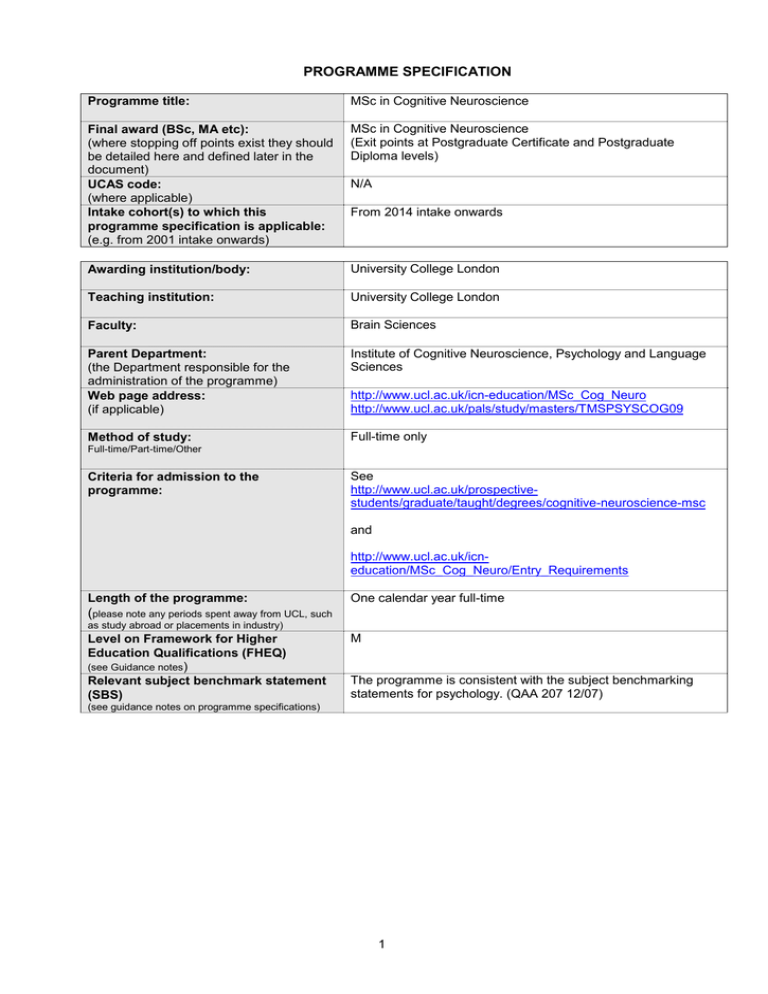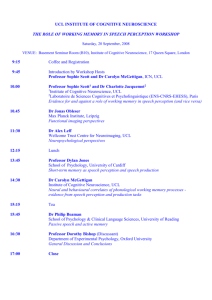PROGRAMME SPECIFICATION
advertisement

PROGRAMME SPECIFICATION Programme title: MSc in Cognitive Neuroscience Final award (BSc, MA etc): (where stopping off points exist they should be detailed here and defined later in the document) UCAS code: (where applicable) Intake cohort(s) to which this programme specification is applicable: (e.g. from 2001 intake onwards) MSc in Cognitive Neuroscience (Exit points at Postgraduate Certificate and Postgraduate Diploma levels) Awarding institution/body: University College London Teaching institution: University College London Faculty: Brain Sciences Parent Department: (the Department responsible for the administration of the programme) Web page address: (if applicable) Institute of Cognitive Neuroscience, Psychology and Language Sciences Method of study: Full-time only N/A From 2014 intake onwards http://www.ucl.ac.uk/icn-education/MSc_Cog_Neuro http://www.ucl.ac.uk/pals/study/masters/TMSPSYSCOG09 Full-time/Part-time/Other Criteria for admission to the programme: See http://www.ucl.ac.uk/prospectivestudents/graduate/taught/degrees/cognitive-neuroscience-msc and http://www.ucl.ac.uk/icneducation/MSc_Cog_Neuro/Entry_Requirements Length of the programme: One calendar year full-time (please note any periods spent away from UCL, such as study abroad or placements in industry) Level on Framework for Higher Education Qualifications (FHEQ) (see Guidance notes) Relevant subject benchmark statement (SBS) M The programme is consistent with the subject benchmarking statements for psychology. (QAA 207 12/07) (see guidance notes on programme specifications) 1 Brief outline of the structure of the programme / its assessment: (see guidance notes on programme specifications) The MSc in Cognitive Neuroscience is worth 180 UCL credits. The programme consists of eight taught modules (each worth 15 UCL credits) and an empirical research project (worth 60 UCL credits). Each element is compulsory and each element is assessed: 1. Research Skills (Statistics): Three one-hour unseen online exams, the best two of which count 2. Communication Skills in Cognitive Neuroscience: One 1,000-1,500 word popular science article and one 3-4 min film 3. Methods in Cognitive Neuroscience I (Lesions Approaches): Two 1,000-1,500 word written reports 4. Methods in Cognitive Neuroscience II (Neuroimaging): Two 1,000-1,500 word written reports 5. Structure and function of the brain: Two-hour unseen written short answer exam 6. Current Issues in Cognitive Neuroscience I (Fundamental Processes): 2,000-3,000 word essay 7. Current Issues in Cognitive Neuroscience II (Elaborative and Adaptive Processes): 2,000-3,000 word essay 8. Current Issues in Cognitive Neuroscience III (Translational Research): 2,000-3,000 word essay 9. Research project: 10,000-12,000 word written dissertation Students have the opportunity to complete one optional formative assessment (a sample essay). Board of Examiners: i) Name of Board of Examiners: Cognitive Neuroscience Board of Examiners Professional body accreditation (if applicable): N/A EDUCATIONAL AIMS OF THE PROGRAMME: The programme aims to teach the foundations, methodology, and state of knowledge in the field of cognitive neuroscience. The course prepares students for academic research in cognitive neuroscience and related areas, and provides a basis for the application of this research in applied settings in a range of areas including marketing, teaching, and consultancy. PROGRAMME OUTCOMES: The programme provides opportunities for students to develop and demonstrate knowledge and understanding, qualities, skills and other attributes in the following areas: A: Knowledge and understanding 2 Knowledge and understanding of: Core principles and applications of cognitive neuroscience; history of cognitive neuroscience; how to study the neural bases of mental phenomena; human brain anatomy; methods of measuring brain function and structure; experimental design and statistics; ethical and safety issues in neuroimaging; neural bases of fundamental, elaborative, adaptive, and applied functions in healthy individuals across the life span and in brain-damaged patients. Teaching/learning methods and strategies: Lectures and seminars including student presentations; discussion of key papers; problem classes; laboratory classes; public engagement classes; supervised dissertation. Assessment: Exam/Essay/Written Reports/Public Science Paper/Short Film/Exercises/Report/Dissertation B: Skills and other attributes Intellectual (thinking) skills: Able to evaluate the pros and cons of different neuroimaging techniques; understand the logic of experimental design and analysis; able to design experiments on the relationship between the mind and the brain; able to choose the appropriate measure for an experimental question; able to specify appropriate psychological tasks for an experimental question. Teaching/learning methods and strategies: Lectures and seminars including student presentations; discussion of key papers; problem classes; laboratory classes; public engagement classes; supervised dissertation. Assessment: Exam/Essay/Written Reports/Public Science Paper/Short Film/Exercises/Report/Dissertation C: Skills and other attributes Practical skills (able to): Analyze data, including statistical analysis; program computers; design and implement experiments in the area of cognitive neuroscience; search the worldwide web for information and references; use a range of software packages, including word processing, visual presentations, and spreadsheets; apply cognitive neuroscience methods. Teaching/learning methods and strategies: Lectures and seminars including student presentations; discussion of key papers; problem classes; laboratory classes; public engagement classes; supervised dissertation. Assessment: Exam/Essay/Written Reports/Public Science Paper/Short Film/Exercises/Report/Dissertation 3 D: Skills and other attributes Transferable skills (able to): Think logically and critically; disseminate knowledge; communicate effectively in oral and written form; interact effectively with individuals and small groups; solve problems; organize and manage projects; time management; learn actively and independently; being creative; assess oneself; make decisions. Teaching/learning methods and strategies: Lectures and seminars including student presentations; discussion of key papers; problem classes; laboratory classes; public engagement classes; supervised dissertation. Assessment: Exam/Essay/Written Reports/Public Science Paper/Short Film/Exercises/Report/Dissertation The following reference points were used in designing the programme: the Framework for Higher Education Qualifications (http://www.qaa.ac.uk/Publications/InformationAndGuidance/Pages/quality-code-A1.aspx); the relevant Subject Benchmark Statements (http://www.qaa.ac.uk/Publications/InformationAndGuidance/Pages/quality-code-A2.aspx); the programme specifications for UCL degree programmes in relevant subjects (where applicable); UCL teaching and learning policies; staff research. Please note: This specification provides a concise summary of the main features of the programme and the learning outcomes that a typical student might reasonably be expected to achieve and demonstrate if he/she takes full advantage of the learning opportunities that are provided. More detailed information on the learning outcomes, content and teaching, learning and assessment methods of each course unit/module can be found in the Departmental course handbook. The accuracy of the information contained in this document is reviewed by the College and may be checked by the Quality Assurance Agency for Higher Education. Programme Organisers: Dr Leun Otten Prof Paul Burgess Date of production: 23 October 2008 Date of latest review and revision: 30 October 2014 4 SCHEME OF AWARD MSc/MRes in Cognitive Neuroscience 2014/15 The Cognitive Neuroscience programmes follow the general UCL criteria for the award of a Masters degree. Marks Each programme is worth 180 UCL credits. The MSc in Cognitive Neuroscience consists of eight taught modules (15 credits each) and a research project of 60 credits. The MRes in Cognitive Neuroscience consists of four taught modules (15 credits each) and a research project of 120 credits. Marks for each Masters element are derived by averaging the marks of the assessments associated with that element. The overall degree mark is computed by taking the average across all element marks, weighted according to the credit value of each element. Marks are rounded to the nearest integer. Degree awards Students are awarded one of four classifications: Distinction, Merit, Pass or Fail. The normal pass mark for a Masters element is 50%. Up to 25% of taught elements may be condoned at 40-49% at the discretion of the Exam Board (i.e. up to 2 taught MSc modules and 1 taught MRes module). The dissertation must always be passed at 50% or above. To achieve a: Distinction: 1. the overall mark, based on 180 credits, is 70% or greater, and 2. the mark for the dissertation is 70% or greater, and 3. there are no marks below 50%, no condoned marks, no re-sit marks and all marks are first attempts. Merit: 1. the overall mark, based on 180 credits, is 60% or greater, and 2. the mark for the dissertation is 60% or greater, and 3. there are no marks below 50%, no condoned marks, no re-sit marks and all marks are first attempts. Pass: 1. the overall mark, based on 180 credits, is 50% or greater, and 2. the mark for the dissertation is 50% or greater. Borderline Criteria If the overall mark is 69% a candidate is in the borderline zone. An award of a Distinction must be made when: 1. the mark for the dissertation is 70% or above; and 2. at least half of the taught credits are at or above 70%; and 3. there are no marks below 50%, no condoned marks, no re-sit marks and all the marks for the modules are first attempts. If the overall mark is 59% a candidate is in the borderline zone. An award of a Merit must be made when: 1. the mark for the dissertation is 60% or above; and 2. at least half of the taught credits are at or above 60%; and 3. there are no marks below 50%, no condoned marks, no re-sit marks and all the marks for the modules are first attempts. 5


